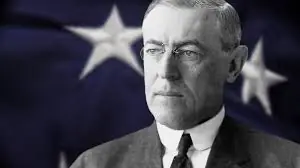The Tariff Bill That Gave Us Woodrow Wilson
One of America’s worst presidents might never have served if not for a tariff bill “progressives” hated.

|
Getting your Trinity Audio player ready...
|
[Want even more content from FPM? Sign up for FPM+ to unlock exclusive series, virtual town-halls with our authors, and more—now for just $3.99/month. Click here to sign up.]
The presidential administration of Woodrow Wilson was a calamity for the United States, but it was an eminently preventable calamity.
In 1908, Theodore Roosevelt was a wildly popular president of the United States who had served for seven and a half years after the assassination of William McKinley. Roosevelt was fifty years old and could easily have won another presidential election, but he had served out most of McKinley’s second term and one term of his own, and believed at the time that the custom of presidents serving only two terms was salutary for the republic.
Roosevelt anointed William Howard Taft as his successor, and the Republican Party cheerfully went along. Taft was easily elected, but by 1912, however, Roosevelt was furious with his chosen successor and decided to challenge him for the Republican nomination. The party split, and one of America’s worst-ever presidents, Woodrow Wilson, entered the White House. If it hadn’t been for one tariff bill, America might have been spared Wilson and Wilsonianism.
Taft entered the White House beholden to Roosevelt’s “progressive” wing of the Republican Party, that is, the faction that favored expanded federal control over the economy and other aspects of American life, a political philosophy that was much in vogue in those days. Taft wanted to give the progressives something they had long wanted: lower tariff rates that would in turn lead to lower prices. However, that would also hurt consumers in the long run by weakening the American businesses that employed them. He threw his support behind a bill that substantially lowered tariffs; it didn’t go as far as the progressives wanted, but Taft explained that it was as good “as we can hope.”
However, in the Senate, supporters of high tariffs piled on amendments that negated the tariff reductions and even raised tariff rates on some items. Taft said and did nothing, arousing the suspicions of the “progressives” who had backed his White House bid. When the bill as amended, the Payne-Aldrich Tariff Act, was passed, he signed it and said: “This is the best tariff bill the Republican party has ever passed, and therefore the best tariff bill that has been passed at all.”
“Progressives” felt betrayed. Taft had let down the people who put him in the White House. Ultimately, Taft’s presidency was destroyed by the dissatisfaction of the “progressives” who had gotten him elected. His first mistake was to ally himself with them and count on their support, for then as now, they were never going to be satisfied with someone who deviated even in the smallest way from their agenda. Ominously, Roosevelt grew increasingly hostile to his former friend.
It was unfortunate that the “progressives” had so much power. The “progressive” label reflected the assumption of this faction and its allies that they were marching in step with the inevitable progression of history, a notion derived from the Marxist/Hegelian determinist view of history and all too often uncritically accepted by the “progressive” movement’s opponents. They also shared the Marxist conviction that a just society could best be achieved by massive state control of the means of production, although of course they did not go nearly as far as Marx did.
There was and is nothing genuinely progressive about progressivism. It was actually a rejection of the freedoms guaranteed in the Bill of Rights and an embrace of state power that inevitably led not to real progress, but to ever-increasing government control of the daily lives of citizens. Authoritarianism—in Fascist Italy, Nazi Germany, the Soviet Union, Communist China, and many other places—would be the bane of the twentieth century; progressivism was a softer version of the same impulse and put America on the same path as those countries, even if the progressives never got as far in the United States as they did elsewhere (or at least they haven’t yet). President Taft failed to please the “progressives” with the Payne-Aldrich Tariff Act, yet he was very much a “progressive” himself. Nevertheless, fed up with what he represented as Taft’s surrender to “the bosses and to the great privileged interests,” Roosevelt challenged Taft for the Republican nomination in 1912. Both candidates were to varying degrees “progressive,” as was the Democratic Party. The Republican split enabled the election of Wilson, who was far more “progressive” than either Roosevelt or Taft.
This was a fateful moment in American history, when progressivism became a powerful movement in American politics; its fortunes have waxed and waned ever since, but it has never left the political arena altogether. It has been the great affliction of the second and third centuries of the American republic.

